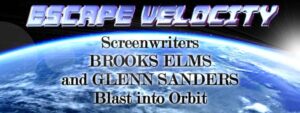ESCAPE VELOCITY
Screenwriters Brooks Elms and Glenn Sanders recently made the trades when they set up their sci-fi thriller Near Earth Object with Chinese studio Le Vision, who plans to make it with an international cast. Not long ago, they were just two guys entering contests — one of which was our own Writers on the Storm, which they won with Wright or Wrong, their comedy about the Wright Brothers’ first misadventures with flight. We caught up with Brooks and Glenn to find out what they’ve been up to since then now that their careers have now achieved escape velocity.
by Jim Cirile
Jim Cirile (JC): So who the heck are you guys?
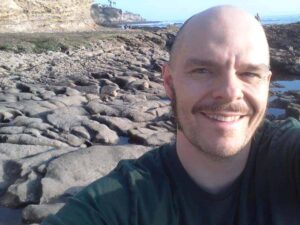 Brooks Elms (BE): I was one of those guys that made a bunch of movies with my friends back in high school. I probably made about 50 short film experiments before attending NYU for undergraduate, where I met one of my writing partners, Glenn Sanders. After film school I made a couple independent features, but in the last 8 or 9 years I focused mostly on screenwriting, getting signed by UTA, selling a couple of scripts, and I’ve now written about 20 scripts.
Brooks Elms (BE): I was one of those guys that made a bunch of movies with my friends back in high school. I probably made about 50 short film experiments before attending NYU for undergraduate, where I met one of my writing partners, Glenn Sanders. After film school I made a couple independent features, but in the last 8 or 9 years I focused mostly on screenwriting, getting signed by UTA, selling a couple of scripts, and I’ve now written about 20 scripts.
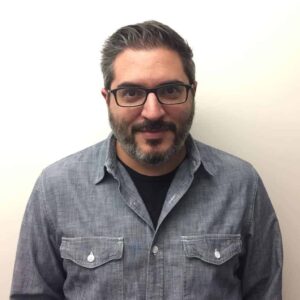 Glenn Sanders (GS): I knew literally when I walked out of the movie theater after seeing Raiders of the Lost Ark that I wanted to be a filmmaker. I didn’t know what that meant; I just knew it was something I wanted to do. I ended up going to NYU, like Brooks, and made a bunch of short films there. I moved out to Los Angeles ’96, and I had a bunch of odd jobs around town at different production companies in various capacities. I ultimately found myself in the advertising world as a copy writer working on traditional ad campaigns on the digital side, back when digital was still a new thing. I really started to hone my storytelling skill and my ability to produce a lot of material quickly. I had gotten involved with writing with Brooks during that time; it was sort of like my nighttime hobby. That led to us writing several scripts together, and a couple of years ago we sold Snowfall to Gold Circle. Now we’re working on Near Earth Object. I now work at a film marketing company called Eclipse in Burbank, and I’ve done digital and social marketing campaigns for Jurassic World, Deadpool, the Back to the Future 30th Anniversary, and dozens of other titles.
Glenn Sanders (GS): I knew literally when I walked out of the movie theater after seeing Raiders of the Lost Ark that I wanted to be a filmmaker. I didn’t know what that meant; I just knew it was something I wanted to do. I ended up going to NYU, like Brooks, and made a bunch of short films there. I moved out to Los Angeles ’96, and I had a bunch of odd jobs around town at different production companies in various capacities. I ultimately found myself in the advertising world as a copy writer working on traditional ad campaigns on the digital side, back when digital was still a new thing. I really started to hone my storytelling skill and my ability to produce a lot of material quickly. I had gotten involved with writing with Brooks during that time; it was sort of like my nighttime hobby. That led to us writing several scripts together, and a couple of years ago we sold Snowfall to Gold Circle. Now we’re working on Near Earth Object. I now work at a film marketing company called Eclipse in Burbank, and I’ve done digital and social marketing campaigns for Jurassic World, Deadpool, the Back to the Future 30th Anniversary, and dozens of other titles.
JC: I know a lot of professional writers at various levels who have other revenue streams, without which they couldn’t pay the bills consistently.
GS: I’m very lucky to have a job that engages my creative skills working with people who are very supportive of my screenwriting. What I learn from one is always influencing and improving what I do in the other.
JC: Brooks, you teach at Story Analysis for Film and Television at UCLA Extension as well. BE: Yeah, which is great, and I’m also in real estate. Paydays come if you work hard enough at it and you’re really focused on doing work that has a larger audience. But the consistency ebbs and flows at any level of the game, so having multiple revenue streams is really a smart way to go. The only way to go, I think.
BE: Yeah, which is great, and I’m also in real estate. Paydays come if you work hard enough at it and you’re really focused on doing work that has a larger audience. But the consistency ebbs and flows at any level of the game, so having multiple revenue streams is really a smart way to go. The only way to go, I think.
JC: Talk a little bit about the genesis of Wright or Wrong.
BE: I’d spent some time in the outer banks of North Carolina, where the Wright brothers flew their airplane contraptions in the 1900s. I thought it would be a really interesting subject for a feature. I talked to Glenn, and we both loved the idea of doing a Wright brothers story. This is the first thing we both worked on together. I really loved Glenn’s sensibility from the movies he made in film school, and I thought tapping into his comedic voice and doing a Wright Brothers story in that tone would be really exciting and a fun way to work with him.
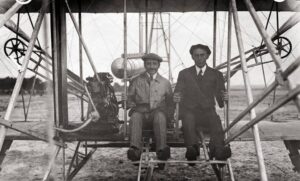 |
| Wilbur and Orville enjoy their business class seats with extra legroom. |
GS: I had written a script a couple years before with another co-writer friend, sort of a western comedy for kids. One of the scenes we wrote was the Wright brothers as kids. The interplay between the two brothers as bickering siblings was one of my favorite things I’d ever written up to that point. I’d always thought at the back of my mind, “Oh, I love those characters, what would you do with them?“ I saw them more as kids than anything. Brooks came to me — “What if we did the Wright brothers story?“ I said, “Are you open to doing this as a comedy like the movie Stepbrothers, except 1903?“ He was game, and that’s where we got started.
BE: It came out really well and we got a lot of attention for it. I’d already had my manager at that point, but we did well in your contest and other contests.
GS: Gary Sanchez (Productions) read it — that’s the production company that Will Ferrell and Adam McKay run — and they really liked it. But they had the same issue we knew about, which is that period comedies are extremely hard to make and sell. Maybe less so now, but 6 or 7 years ago when we wrote it, it was just a real challenge. Markets were kind of collapsing. But it was an amazing experience, and now we’re on our 6th or 7th script.
JC: If you’ve got Will Ferrell in a Wright Bros. comedy, who wouldn’t make that movie? How could that not get set up? We’re talking internationally known source material!
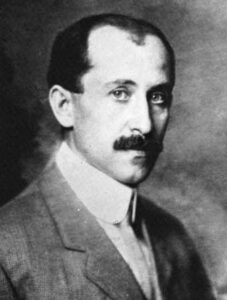 |
| Will Ferrell would kill as Orville. |
BE: You’re preaching to the choir. We did get an option offer on it, from a producer that has a couple cool things cooking and in development. He didn’t have any money, and we were so busy with the sci-fi thing that we really couldn’t take time off and do a few polishes for free. The other interesting thing is, because we’re talking about siblings, we always thought that it would be a real nice fit for sibling directors or sibling actors — something like that where there’s an added level of personal connection to it. I think it’s one of those things where the right person is going to come along, and it can happen very quickly. There’s still a lot of interest.
GS: Talking to the producer about Near Earth Object, and why he was so excited about the material, tells us a lot about why Wright or Wrong is such a difficult sell. There are so many reasons to say no to that material. You could say, “Oh, it’s a period piece’. So that’s gonna cost more money. “Oh, its a comedy, but the tone isn’t in line with what comedy is doing right now.“
JC: Hollywood is extremely narrow in the type of comedy they’ll make now. Ridiculous, of course.
GS: When we wrote it, there was a moment where the pendulum of comedy swung towards grounded, Judd Apatow-type, character–focused comedy. This was very much an absurdist kind of romp and very fantastical and silly. It also wasn’t particularly edgy, so it wasn’t a bunch of dick jokes and things like that. So it didn’t quite hit exactly what the more outrageous comedy was doing or what the most grounded comedy was doing at the time.
JC: Why did you guys segue from comedy into sci-fi?
 |
| The International Space Station (I.S.S.) |
BE: I was talking to another guy we went to NYU with, Evan Astrowsky, who is a producer with about a dozen produced credits. He (encouraged me) to take my writing voice into the genre space. I was resistant at first, because I liked some genre films, but I wasn’t much of a genre fan just for the genre itself. Then I thought this guy has good connections, and he’s inviting me to create. I came up with a couple of concepts, but there was this one, Snowfall, about a bunch of commuters stuck on a train during a massive blizzard, which turns out to be cover for an alien invasion. Glenn really liked it, and we developed together. Glenn and I were gonna co-direct it, and then Evan was gonna produce it. But Evan said, “Look, this is really strong material, and I think I might be able to get it set up in a bigger way.” He took us in to his contacts at UTA. They signed us, and we went out with the script, and eventually it landed at Gold Circle.
After a period of development, it ended up going into turnaround. So now we have two really strong versions of it — one that’s about a million version, one you could probably shoot for or million. I gave both of those drafts to one of my UCLA classes. I split the class in half and the ratings were, interestingly, exactly the same. The people on average liked the earlier version as much as they liked the other version.
GS: We were so far along.They were already location scouting in Canada. I think it just kind of lost momentum, and then suddenly it wasn’t the hottest project on the docket after all this time developing it. It’s painful and it’s frustrating. It’s a good education in setting expectations. (For our) next project we wanted to do something that was a little bit bigger in scale, (but) still contained and producible. We wanted to make something easy for someone to say yes to. We wanted to eliminate any reason to say no and have the material stand or fall based on the quality of writing itself. Ultimately, that became Near Earth Object.
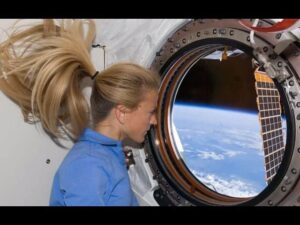 JC: And big congrats on setting that one set up! It seems like everybody is getting on the China bandwagon nowadays. What was the process of getting the script out there, and how did Le Vision come aboard?
JC: And big congrats on setting that one set up! It seems like everybody is getting on the China bandwagon nowadays. What was the process of getting the script out there, and how did Le Vision come aboard?
GS: Once we finished the script, we handed it out to our agents and manager and lawyer. The response from our internal team was fantastic. UTA got extremely excited about it. Within about two weeks, they had set a plan and put it out to a bunch of different companies around town. Among that list was Le Vision — former Paramount Pictures President Adam Goodman and his team.
JC: Goodman is now helming Le Vision, one of the largest movie companies in China, and has a slate of English language films.
BE: The concept was organically international. It wasn’t a Chinese guy shoehorned into an American movie or vice versa. The concept was about the teamwork between a group of astronauts stranded together, and they all need to work together to confront big problems when they’re up on the International Space Station. Adam responded strongly to it being organically international and contained. It can be a tent pole movie but not nearly at the tent pole price. We were smart about limiting locations.
JC: Awesome! What’s the one–liner?
 |
| ISS 27 Mission Patch |
BE: I can’t say too much, but… when a team of astronauts get stranded on the international space station, they have to work together to confront what could be the end of the world. Them being stranded is the very thing that makes them key to saving humanity. It turns out because they’re isolated, they’re the only ones who can save humanity.
JC: Nice. So what’s happening with Near Earth Object?
BE: We met with Le Vision a bunch of times, and they’re really awesome guys. Smart notes, loved the project, great to work with, very sharp. It’s been awesome. We’ve written a treatment for the new draft. Then probably another polish or two on the treatment, and then we jump into the new draft. They’re very excited and want to get it moving as soon as possible.
JC: Any whispers of casting yet?
GS: It’s too soon. The next step would be getting the script right, then getting a director on board. Le Vision has been a force in China but only recently opened up in the United States. Adam was named as the president of Le Vision in the U.S. in September. We have the honor and distinction of being the first project that they picked up.
BE: They make about 18 movies for the China market a year. Them expanding to Hollywood was a real natural progression. They were really smart to bring on Adam, who was at DreamWorks and Paramount. He’s super sharp, and I think he’s gonna do great things for them.
GS: In the development process, what we found exciting was that his instincts are really sharp. We feel that the way he’s pushing us is significantly improving the material. We feel like we’re learning from him and the rest of the team as we go along. Even in the couple of months we’ve worked together and the little bit of work that we’ve done so far, we’re increasingly excited. When you go into a producer relationship, you don’t know what to expect. The whole team’s treated us with nothing but respect and also have provided us with notes that have been great.
JC: Guys, you did it — you made good. Proud of you. Keep on rocking it, and I look forward to seeing Near Earth Object at the multiplex.

